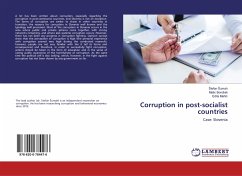A lot has been written about corruption, especially regarding the corruption in post-communist countries, and Slovenia is not an exception. The forms of corruption are similar to those in other countries in transition, the reasons for corruption in Slovenia well known and the typology well processed. Most of the corruption in Slovenia occurs in the area where public and private spheres come together, with strong networks remaining, and where also systemic corruption occurs. However, there has not been any progress in corruption fighting. Opinion surveys show that the perception of corruption is high (the personal experience with corruption proved very high during the conducted research), however, people are not very familiar with the it (all its forms and consequences) and therefore, in order to successfully fight corruption, actions should be taken in the form of education and in the sense of raising public awareness of the harmfulness of corruption. At the same time the political will is also lacking, which, however, in the fight against corruption has not been shown by any government so far.
Bitte wählen Sie Ihr Anliegen aus.
Rechnungen
Retourenschein anfordern
Bestellstatus
Storno








